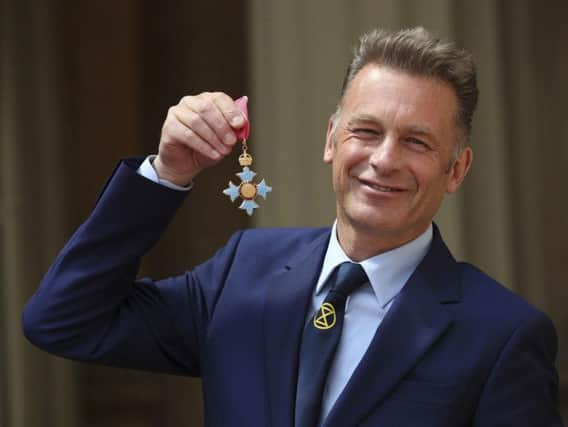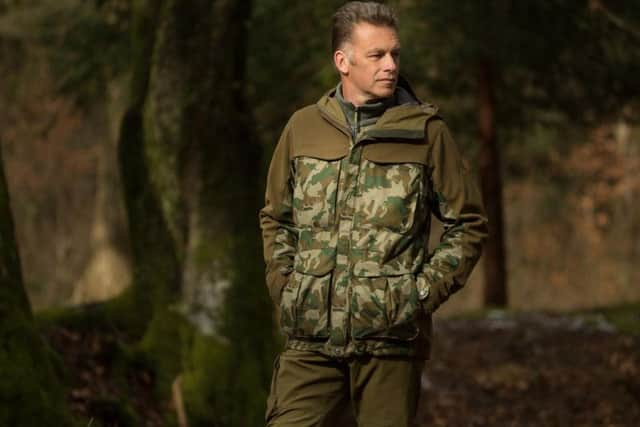Chris Packham on wildlife campaigning, Greta Thunberg and living with Asperger's


Earlier this week the environmental campaign group Extinction Rebellion began a prolonged series of protests in cities around the world, including in London, Berlin, New York and Sydney. The movement, which is calling on governments to declare a “climate and ecological emergency” and take immediate action to address climate change, has gained traction, especially among younger generations, though its disruptive methods are proving controversial.
The naturalist, TV presenter and conservationist Chris Packham is among those supporting the movement. “We want more urgent action and what we’ve seen in the past is that non-violent demonstrations have been successful. So I feel this modern movement will continue to grow because as it’s growing we’re seeing climate change coming to the fore,” he says.Packham is a familiar face to fans of TV shows such as the BBC’s Springwatch and Autumnwatch and next weekend he’s in Harrogate for an ‘in conversation with’ event, presented by Cause UK in association with The Wild Watch, where he will discuss his wildlife conservation work and his moving autobiography, Fingers in the Sparkle Jar.
Advertisement
Hide AdAdvertisement
Hide Ad

He has repeatedly spoken out about the decline of British wildlife. “We should be very alarmed. You can only push species and ecosystems so far before they crack,” he says. “We’ve lost 90 million birds in the UK countryside since 1970. So there’s an enormous cloud of guilt hanging over me that those losses have happened on my watch and I feel compelled to use every minute of every day to try and redress these things, and that’s probably why I’m approaching them with a little bit more ferocity than I have done in the past. As you get older, you become more conscious of your own mortality and you think you have less time to make a bigger difference.”
When it comes to how we manage the countryside, the farming community and conservationists don’t always see eye to eye. “If I were a farmer I would say to the conservationists, ‘OK, I’ll listen to you, I’ll think about doing what you’re asking me to do. But in return I’d like your support.’ And what we, the conservationists and the British public haven’t been doing is properly supporting our farmers. The idea of New Zealand lamb in the 21st century being on sale cheaper than UK lamb in our supermarkets is quite beyond my comprehension. We have perfectly good lamb in the UK, we are perfectly capable of producing it and selling it at a price which will put profit into the pockets of our farmers. Unfortunately consumers, that’s me and you, have got used to cheap food.”
Advertisement
Hide AdAdvertisement
Hide AdHe says more needs to be done to support low-density organic farming methods. “We need these good farming practices and we need them spun out over a much wider area and if we could do that we could recover an enormous amount of those lost species. We have the capacity, we just have to build the relationships and support not just the big farmers, but the little farmers too.”
Packham’s passion for wildlife dates back to his childhood growing up on the south coast. “I still have a series of books I was given for my first and second birthdays from my grandparents all about birds and bug wildlife.”Having initially started out doing wildlife photography –something he still enjoys today – he found himself in front of the camera, his big break coming in 1986 when he joined The Really Wild Show. “I had no plans to switch sides, it was something that just happened. I wasn’t given any training and I’ve been learning on the job ever since.”
Packham, who was presented with a CBE for his services to nature conservation earlier this year, is a vociferous opponent of the badger cull and a leading campaigner in the call to ban driven grouse shooting. Such stances have put him in the firing line and earlier this year he revealed he’d received death threats after he backed a legal bid to restrict the shooting of “pest” birds. The threats were universally condemned and Packham himself refuses to be cowed by hate campaigns. “Every morning I get up and think ‘how can I make a difference today?’ I have a small voice to communicate to people and I think it’s important that I exercise that voice and that means sticking my head above the parapet...As my friend Billy Bragg said, ‘if you’re not getting flak then aim for the target.’”
The 58-year-old has been equally frank when discussing Asperger’s syndrome. He was in his 40s when he was diagnosed, by which time he’d pretty much figured out that he had the condition. “It wasn’t a great revelation. I’d already put in place management systems to deal with some of the aspects of the Asperger’s which I’d come up with myself. It was hard work and I hope young people today get more support so they don’t have to go through some of the trials and tribulations I did. But I found a method of existing, it isn’t perfect and I still make mistakes.”
Advertisement
Hide AdAdvertisement
Hide AdHe prefers to focus on the positive aspects of the condition. “In my field, being able to remember facts and figures is an asset and I have to say, rather like Greta [Thunberg], I see my Asperger’s as a gift, though sometimes it’s a gift that you unwrap and it isn’t what you want, that’s the other side of it.”He empathises with Thunberg – the teenage activist who calls Asperger’s her ‘superpower’. “I have enormous admiration for her energy, I know where that comes from because we share that condition, and we say what we think. My mother used to call me ‘tactless’, though she didn’t live long enough to know about my diagnosis. But we’re not tactless, we say what’s what and we’re prepared to say what’s what to anyone. I’ve never pulled a punch in my life and I’m never going to go gently into any good night, I’m going to rage and rage against the dying of that light.
“What we find with a lot of people with Asperger’s is they react poorly to injustice. I can recall as a kid that nothing pained me more than being blamed for something I didn’t do, or seeing someone else blamed for something they didn’t do.
I’m pretty certain, though I don’t know because I haven’t met her, that it’s the same for Greta. She will hate the injustice that she knows these people are wrong and they aren’t doing anything about it, and therefore she will not bite her tongue, and nor will I.”
Chris Packham, The Royal Hall, Harrogate, Oct 19, 7pm. For details go to www.harrogatetheatre.co.uk/whats-on/An-Evening-with-Chris-Packham